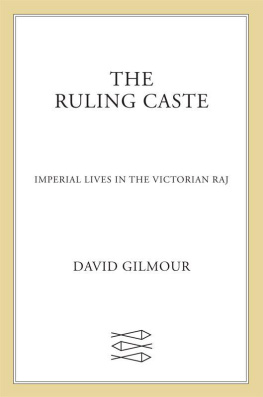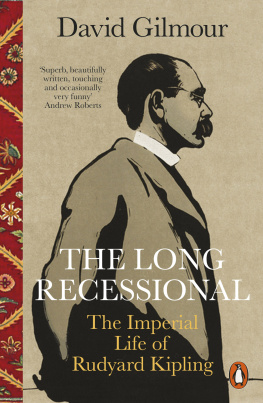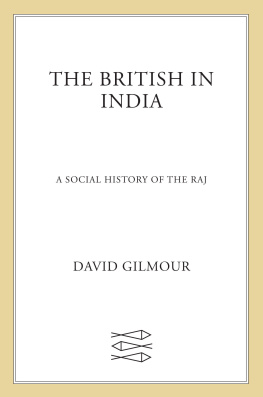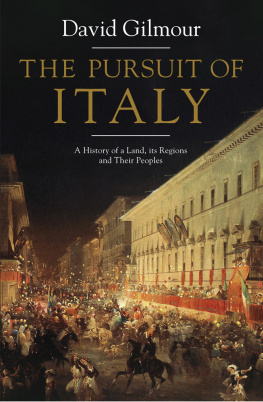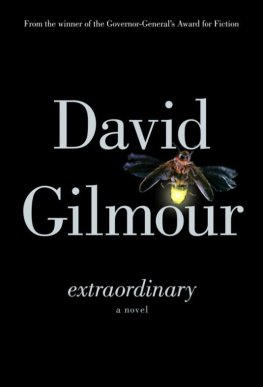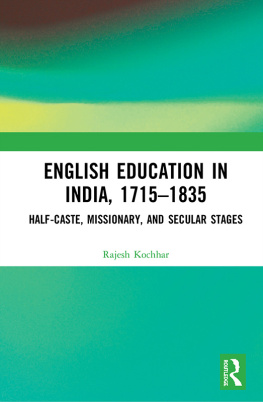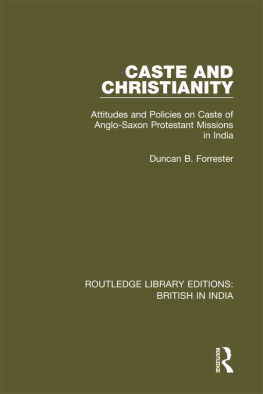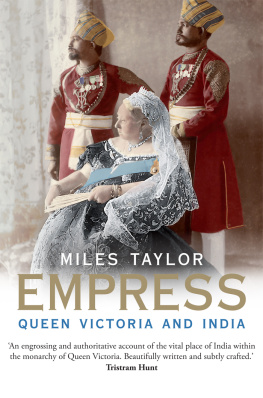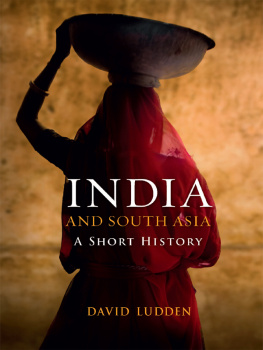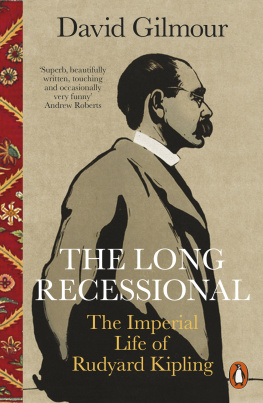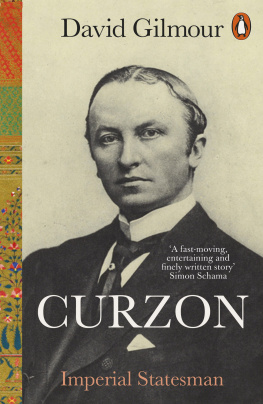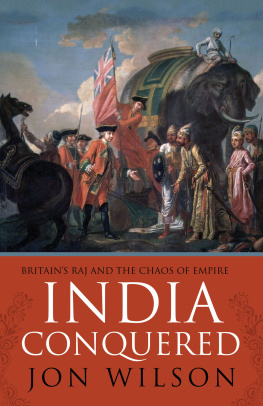
The author and publisher have provided this e-book to you for your personal use only. You may not make this e-book publicly available in any way. Copyright infringement is against the law. If you believe the copy of this e-book you are reading infringes on the authors copyright, please notify the publisher at: us.macmillanusa.com/piracy.
Contents
To Maurice Keen
and in memory of Richard Cobb
friends and mentors
Preface
D URING THEIR BRIEF momentous period of collaboration, Joseph Stalin and Joachim von Ribbentrop agreed that it was absurd that so much of the world should be ruled by Great Britain. In particular, the Russian leader told the Nazi Foreign Minister, it was ridiculous that a few hundred Englishmen should dominate India. He was referring to the men of the Indian Civil Service (ICS).
The statistic alone seems ridiculous. In 1901, when Queen Victoria died, the few hundred numbered just over a thousand, of whom a fifth were at any time either sick or on leave. Yet they administered directly (in British India) or indirectly (in the princely states) a population of nearly 300 million people spread over the territory of modern India, Pakistan, Burma and Bangladesh.
Stalins grumble contained perhaps a touch of tacit admiration. More explicit praise came from earlier foreign leaders who, like him, had been in search of empires to rule. Bismarck thought Britains work in India would be one of its lasting monuments, while Theodore Roosevelt told the British they had done such marvellous things in India that they might gradually, as century succeeds century transform the Indian population, not in blood, probably not in speech, but in government and culture, and thus leave [their] impress as Rome did hers on Western Europe.
It is not difficult to find foreign eulogies of British civil servants in India, from the French Abb Dubois, who in 1822 extolled their uprightness of character, education and ability, to the Austrian Baron Hbner who in 1886 ascribed the miracles of British administration to the devotion, intelligence, the courage, the perseverance, and the skill combined with an integrity proof against all temptation, of a handful of officials and magistrates who govern and administer the Indian Empire.
The same words recur again and again, even from Indian nationalists and their newspapers at the end of the nineteenth century: impartial, high-minded, conscientious, incorruptible. The ICS may have had its critics even within its own ranks but about its elevated standards there was no argument. N.B. Bonarjee, a member of the Service but also an Indian nationalist, praised its rectitude, its sense of justice, its tolerance, its sense of public duty, as well as its high administrative ability.
The high reputation of the ICS was never reflected in the literature of the country where most of its members were born. This was no doubt partly because civil servants do not make exciting characters in fiction, even when they do much of their work on horseback. During the existence of the Raj they sometimes appeared in the novels of largely forgotten authors such as Alexander Allardyce, Flora Annie Steel, W. W. Hunter, Edward Thompson and A. E. W. Mason. More recently they have featured in the fiction of three winners of the Booker Prize, although not in any leading role except in J. G. Farrells The Siege of Krishnapur, a historical novel about the Indian Mutiny. In Ruth Prawer Jhabvalas Heat and Dust the civil servant is a hapless figure whose wife has an affair with the local nawab, while in Paul Scotts The Jewel in the Crown he is an uncomfortable liberal who disavows his predecessors and is limited to a brief appearance in a single volume of the Raj Quartet.
Scotts work, criticized both by Indian nationalists and by British conservatives, is a brilliant portrait of the Raj in its closing years. Yet it is limited not only in time but also in the range of its British characters, who (apart from some missionaries) are nearly all connected to the Army. Rudyard Kipling painted a fuller and richer picture of the Raj at its zenith, but this too is restricted in scope, mainly because he lived nearly all his time in the Punjab and left India at the age of 23. He also took most of his characters from the military (with a preference for NCOs and Other Ranks), and distributed his civilians in professions as diverse as forestry and engineering. Some of Kiplings few civil servants are strong men, dedicated paternalists obsessed with duty and the welfare of Indians. But others are pedantic or frivolous or impractical. In his story Tods Amendment he gave a 6-year-old boy more understanding of agricultural tenancies than the Legal Member of the Viceroys Council.
Although Kipling was the principal chronicler of British India, the most enduring effigy of its administrators was carved by E. M. Forster in A Passage to India. The two writers approached the Subcontinent from angles that could hardly have been more different. Kipling was born in India and returned at the age of 16 to earn his living as a journalist in Lahore. Forster had already published most of his novels by the time he sailed for Bombay in search of India and Indian friendships. There was nothing in his background, character or outlook that predisposed him to look favourably on the Raj. Indeed several of his friends in the Bloomsbury Group had abandoned their traditional family links with imperial rule.
A Passage to India is a subtle and in certain ways sensitive work, a well-crafted drama with an evocative sense of place and some plausible Indian characters. But its authors loathing of the British in India a feeling he confessed to in private turned it into a tendentious political novel, at any rate for many of his contemporary readers. Kipling was fascinated by other mens professions and wrote numerous stories about work; so was Scott, who diligently carried out research into how the British had administered India. But Forster was seldom interested in writing about work; he preferred portraying people at their leisure or in their domesticity in Florence and the Home Counties. He did not see civil servants inspecting hospitals or canals but witnessed them relaxing at the Club, where he judged them philistine and stupid. Then he turned them into caricatures. His District Officer, Turton, is pompous and absurd and wants to flog every native in sight as soon as there is a crisis; his mem-sahibs are even worse, crude stereotypes, compounds of nothing but snobbery and racial prejudice. Their actions are seldom more credible than their characters. Forster makes them react to an obscure incident in a cave as if it had been a minor massacre. They gather at the club and make semi-hysterical suggestions about calling out the Army, clearing the bazaars and sending the women and children to the hills. There is almost nothing believable about the scene at the club or about the arrest and trial of Aziz, where Forsters ignorance of administration and judicial procedure let him down again. Yet these events, described in fiction and depicted in film, form one of the most abiding images of British India.
The principal historical portrait is a kinder one. Fifty years ago, a former civil servant, Philip Mason, published (under the pseudonym Philip Woodruff) his two volumes of The Men Who Ruled India, The Founders and The Guardians. They are the work of a wise man and a talented writer who wrote affectionately yet sometimes critically of a Service which had on the whole, he thought, justified its reputation for altruism and benevolent rule. Although regularly and unfairly denounced by post-colonial critics as hagiography, it is the work on the subject best known to non-academic readers.
Next page
